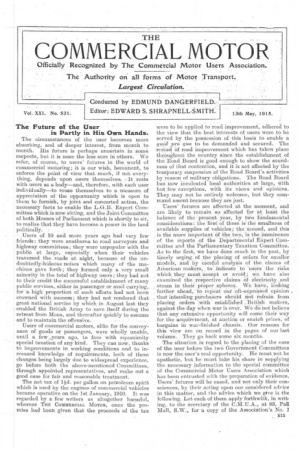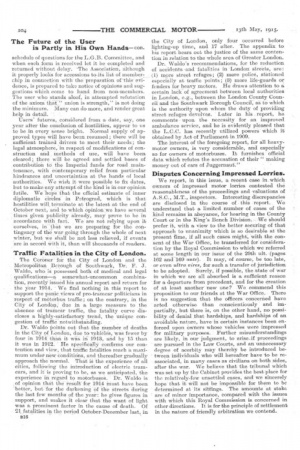The Future of the User
Page 1

Page 2

If you've noticed an error in this article please click here to report it so we can fix it.
is Partly in His. Own Hands.
The circumstances of the user becomes more absorbing, and of deeper interest, from month to month. His future is perhaps uncertain in some respects, but it is none the less sure in others. We refer, of course, to users' futures in the . world of commercial motoring ; it is our wish, hereanent, to enforce the point of view that much, if not every, thing, depends upon ■users themselv,eo. o It_ rests with users as a body—and, therefore, with each user individually—to rouse themselves to a• Measuro of appreciation of the opportunity .which is open to them, to furnish, by joint and concerted action, the necessary facts to enable the L.G.B. Expert Committee which is riow sitting, and the Joint Committee of both Houses 'of Parliament which is shortly to sit, to realise 'that they have become a power in the land Users of 10 and more years ago had very few friends:, they were anathema to road surveyors and highway committees; they were unpopular with.the public at large, especially when their vehicles traversed the roads at night, because of the undoubtedly-hideous noises which many of the machines gave forth; they fanned only a very small minority in the total of highway users ;.they had net to their credit the successful establishment of many . public services,, either in passenger.or mail carrying, for -a. high•propOrtion of such efforts had not been crowned with .success; they had not. rendered that great national service by which in August last they • enabled the British Army to save itself during the retreat from Mons, and thereafter quickly to assume _ and to maintain the offensive. • • • • Users of commercial motors, alike for the conveyance of goods or passengers, were wholly unable, until a few _years ago, to face with ,equanimity • special taxation of any kind. They can now, thanks to improvements in working conditions and to increased knowledge of requirements, both of these changes being largely due to widespread experience, go before both the above-mentioned Committees, through • appointed representatives,' and make out a good ease for fair and reasonable treatment.
The net tax of lid. per gallon on petroleum. spirit which is used by the.engines of commercial vehicles became operative on the 1st January, 1910. It was regarded by a few writers as altogether harmful, whereas Tine COTICAEROIAL MOTOR, Once the promise had been given that the proceeds of the tax were to be applied to road improvement, adhered to the view thatthe bast interests of users were to be served by the poss,ession of this basis to enable quid' .pro quo to be demanded and secured. The record, of road improvement which has taken place throughout the country since the, establishment of the Road Board is good enough to show the soundness of that contention, and it is not affected by the temporary suspension of the Road Board's activities by reason of military obligations. The Road Board bas. now inculcated local authorities at large, With but few exceptions, with its views and opinions. They may not be entirely welcome, but they command assent because they are just.
Users' futures are affected at the moment, and are • likely to 'reMain•-so .affected TO at least the balance of the present year, by two 'fundamental considerations the'fit-St of these iS•the srnallnesSof available supplies of vehieles.; the second and this is the More important Of the two, is the imminence of the reports of the Departmental Expert Cernmittee and the Parliainentary Taxation Conornittee. As to the first., we have done much in the past, by timely urging:of the placing of orders for smaller . , Models, arid by Careful analysis of the claiins of American Makers'. to indicate -to -users ..the risks which the must -accept or avOid; _ we have also examined the reSPective alairris Of electricity and steam in their "proper .spheres, We haVe, farther ahead, • to repeat our :oft-eXpressed opinion , that intending purchasers should not refrain from placing orders with established ..British makers, against the day when war is over. We dci,-not believe that any extensive opportunity will come their "way for the acquirement, at auction or snatch price.e, of bargains in war-finished chassis. Our reasons for this view are on record in the pages of our last volume. They go back some six months.
The situation.in regard to the placing of the case of the .user before the two Government Committees is now the user's real opportunity., must not be apathetic, but he must take his sare in supplying the necessary information to the special committee ofthe Commercial Motor Users Association which has been entrusted with the preparation of evidence. Users' futures will be eased, and not only their consciences, by their acting upon our considered advice in this matter, and the advice which we give is the following. Let each of them apply forthwith, in writ, ing, to the secretary of the C.M.U.A., at 83, •Pall Mall, S.W., for a copy of the Association's No. 1
The Future of the User
is Partly in His Own Hands—con.
schedule of questions for the L.G.B. Conimittee, and when each form is received let it be completed and returned without delay. he Association, although it properly looks for accessions to.its list of member: chip in connection with the preparation of-this evidence, is prepared to take notice of opinions and suggestions which come to hand from non-members. The user who stands aloof, in attempted refutation of the axiom that:` union is strength," is not doing the minimum. Many can do more, and render great help in detail.
Users' futures, considered from a date, say, one year after the conclusion of .hostilities, appear to us to be in every sense bright.. Normal supply of approved types will have been resumed; there will be sufficient trained :drivers to meet their needs; the legal atmosphere, in respect of modifications of construction and methods of use, will have been cleared; there will be agreod and settled bases of .contribution to the Imperial funds for road main • tenance, with contemporary relief from particular hindrances and uncertainties at the hands of local authorities. We Wish it were possible. to fix dates, but to make any atternpt Of the kind is in our opinion futile. We hope that the official estimate of inner diplomatic Circles' in Petrograd, which is that hostilities will terminate at. the latest at the end of October next, and to which opinion we have several times given publicity already, may prove to he in accordance With Jact. We are not. relying upon it -ourselves, in that we are preparing for the contingency of the war going through the whole of next winter, but we shall be not less relieved, if events are in accord with it, than will thousands of readers.
Traffic Fatalities in the City of London.
The Caren:Qr.for the City of London and the Metropolitan. Borough of Southwark, Dr. F. J. Waldo, who iS Possessed both of medical and legal . qualificationsa ..somewhat-Uncommon combination, recently issued his annual report and return for the Year 1914.We find nothing in this report to support the panieyiewsof pro-tramcar politicians in respect Of motorbus traffic; on the contrary, in the City of London,' .due in a large measure to the abSence of tranacar traffic, the fatality curve discloses a highiy-satisfactory trend, the unique congestion of traffic notwithstanding, Dr. Waldo Points out that the number of deaths in the City of London, due to vehicles, .was fewer by four in 1914. than it was iriiOf3, and by 15 than it was in 1912. lie speeificailY Confirms our contention and view, that traffic fatalities reach 4 maximum under new Conditions,. and thereafter gradually approach the nonnal. That iS the experience of all cities, follOwing the introduction of electric tramcars, and if is proving to be, as we anticipated, the experience in regard to MotorbuSei. • Dr. Waldo is of opinion that the-resulf for 1914 Must have been 'better, but for the darkening Of the streets during the last few months of the year: he gives figures in support, and makes it clear that the want of light was a prominent factor in the cause of death. Of 21. fatalities in the period October-December last, in. the City of London, only four occurred before lighting-up time, and 17 after. The appendix to his report bears out the justice of the same contention in relation to the whole area of Greater London.
Dr.. Waldo's recommendations, for the reduction of accidents -and fatalities in -London streets, are: (I) more street refuges; (2) more police, stationed especially at traffic points; (3) more life-guards or fenders for heavy motors. He draws attention to a certain lack ofagreement between local authorities in London, e.g., between the London County Council and the Southwark Borough Council; as to which is the authority upon whom the duty of providing street refuges devolves. Later in his . report, he comments upon the necessity for an improved ambulance service, and he is evidently pleased that the L.C.C. has recently utilized powers .-cifhich it obtained by Act of Parliament in 1909. The interest of the foregoing report, for all heavymotor owners, is very considerable, and especially so for owners of motorbuses. It furnishes • official data which refutes the accusation of their " making money out of cars of Juggernaut.'"
Disputes Concerning Impressed Lorries.
We report, in this issue, a recent CaBP in which owners of impressed motor lorries contested the reasonableness of the proceedings and valuations "of .S.C., M. T., inspectors. Interesting discrepancies are disclosed in the course of this .report. We understand that a limited number of cases of the kind remains in abeyance., for hearing in the County Court or in the King's Bench Division. We should prefer it, with a view to the better securing of that approach to unanimity which is so desirable at: the present firne, if all such eases Might, With the consent of the Wax Office, be transferred for consideration by the Royal Commission to which we referred at some length in our issue of the. 29th ult. -(pages 1.62 and '169 ante). It may:, of course, be too late, or even ultra vires, for such a transfer of jurisdiction. to be adopted. Surely, if possible, the .state of war in which we are all absorbed is a sufficient reason for a departure from precedent, and for the Creation of at least another new one? We commend this proposition to our friends at the War Mee.. There is no suggestion that the officers concerned have acted otherwise: than conscientiously and impartially, but there. is, on the other hand, no possibility. of denial that. hardships, and hardships of an avoidable nature, have in certain instances been enforced upon owners whose vehicles were impressed • for military purpoces: Further misunderstandings are likely, in onr judgment, to arise.if proceedings are pursued in the Law Courts, and an'unnecessary degree of acerbity may thereby be introduced be' tween individuals who will hereafter have to be reassociated, in many cases as civilians on •both sides, after the war. We believe that the tribunal which was set up by the Cabinet provides the beat placefor the relatively-few unsettled cases, and we sincerely hopethat it Will not be impossible for them to be deterrnined at its sittings. The amounts at stake are of minor importance., coropared with the issues with which this Royal Commission is concerned in other directions. It is for the principle of settlement in the nature of friendly arbitration we contend.






















